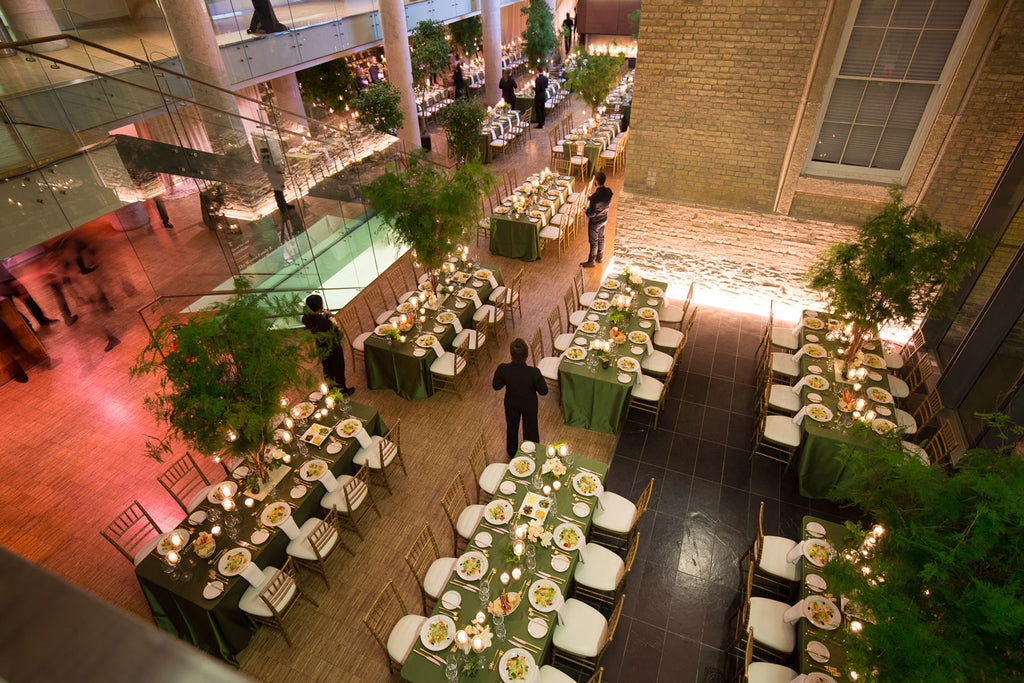FACE THE FACTS: Sustainable Catering Can Be Sustained.
Originally published in MPI magazine
By: Don Sagarese
Vice President, 10tation event catering inc.

As a caterer and event planner one must face the facts: at most events, food and food service constitutes the most significant source of waste and with that, the most significant impact on the environment. To ignore this would be both foolish and irresponsible. To do nothing with our current knowledge would be mindless.
Established in the spring of 2000, 10tation Event Catering Inc. produces some of the most polished and stylish events for discerning clients ranging from 2-10,000 guests. We have had the luxury of watching our world expand and evolve, and with it, so have we. We separate waste into 5 compartments including: cardboard, compost, tin and glass, oils, and waste. We have eliminated plastics in our operations and have installed efficient lighting and ventilation systems. We use cleaning products that are biodegradable, ammonia and phosphate free, and have purchased carbon offsets to neutralize the carbon produced by our delivery fleet.
It’s difficult however, to have a single policy that dictates our behavior at every event where sustainability is concerned. There are simply too many competing views, too many variables and event variations, each dictated by specific and often limited budgets, rigid timelines and grossly underestimated logistics schedules. It is imperative therefore that we support climate and environmental action organizations and implement systems and processes in our day to day operations that lend themselves to a cleaner…greener future. These are divided in the following ways:
Realistic Tactics
FACE THE FACTS: Reality is too large a degree, what you make it, and there are things that we do have control over, things that have been proven to reduce our impact on the environment.
Locally Grown: Less miles from farm to table, by definition, means a smaller carbon footprint and more support for local producers.
Vegetarian: Attractive and appealing vegan and vegetarian offerings for all guests means a decrease in animal production, and as a result, a decrease in greenhouse gas emissions.
Organic: Use of more organic products when economically feasible, means a decrease of chemical inputs used in conventional farming, and therefore reduction of pollutants in our waterways and soils.
Ethically Produced: The globalization, urbanization, socialization and politicization of food have decreased the natural order of food production and has therefore increased environmental impacts. Ethically produced foods imply fair trade, better living wages for all and less harmful effects of automation and packaging.

Relationships
FACE THE FACTS: Building relationships allows you to build trust and as a result, make recommendations that clients will accept. It also allows you to collaborate more effectively with vendors and be more mindful about waste.
Proximity: Work with clients and vendors closer to your head office and kitchens limits geographic distances thereby reducing costs and carbon emissions.
Venues: Stronger relationships with clients allows you to recommend event locations with stronger commitments to recycling and composting programs.
Electronic: Invites, advertising, menus, signage and wayfinding, all look to punctuate the event and the brands hosting, however, use of social media and audio-visual tactics for all communication before, during and after the event will result in savings…and save the planet, one piece of paper at a time.
Bulk: Bulk service of items like condiments and beverages combined with real china and flatware for consumption can dramatically decrease the amount of waste and recycling produced at an event.
Donation Channels: Although the caterers’ goal is to clearly avoid over production, it is important to have clear and efficient donation channels. In addition to providing meals for those in need, you diminish the amounts of post-consumer food waste and eliminate a major portion of the overall waste stream.

Repeat Customers
FACE THE FACTS: Having repeat customers is a more efficient and thereby cost-effective business model. It doesn’t hurt that it also provides you with the opportunity to promote more environmentally friendly practices.
Education: With more trust comes the ability to educate clients about food and service methods directing them to more environmentally friendly solutions.
Referrals: It’s doubly hard and less environmentally friendly to obtain new customers over satisfying and encouraging repeat customers. Tying your efforts into technical and social media programs ensures less advertising waste and collaboration with more like-minded individuals.
Bulk Delivery & Pick ups: Repeat business allows for more business, and more contacts within the same locations one delivers to, resulting in bulk or multiple deliveries, and increased use of of real china, flatware and other event and catering equipment.
Less Paper: Repeat customers ensures more automated and online processes can be implemented in most cases saving time and paper.
FACE THE FACTS: food and food service are a necessity. Unlike other industries that will inevitably succumb to change and become obsolete, ours is one that will, by definition, grow steadily and incrementally, supporting and ever-increasing population and the events for which we gather to for corporate events, intimate affairs, big bashes and weddings. It is our responsibility to seek new and more efficient ways to mitigate our negative impact on the environment, ensuring continued success, but not at the expense of future generations.


Don Sagarese is a lifelong hospitalitarian who was a dishwasher, turned waiter, turned maître’d, turned event planner, business owner, Professor and now Vice President at 10tation event catering Inc.


